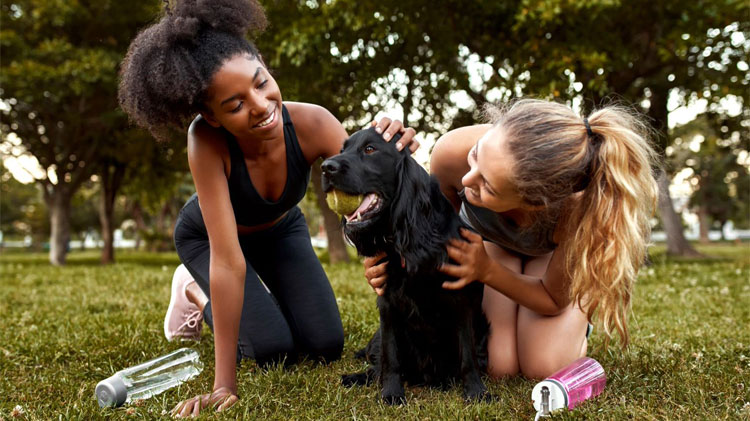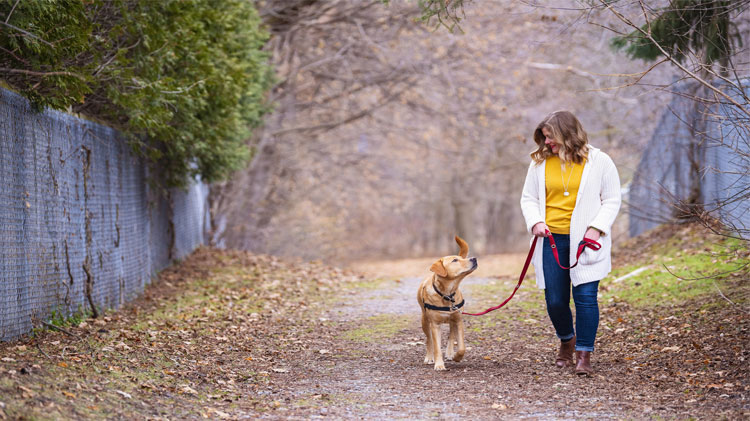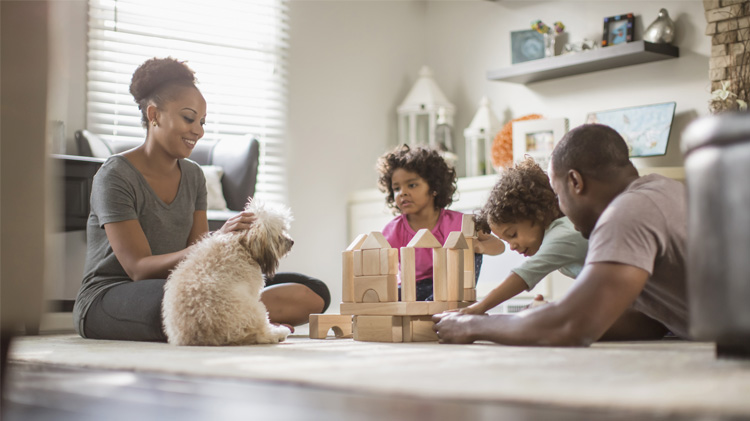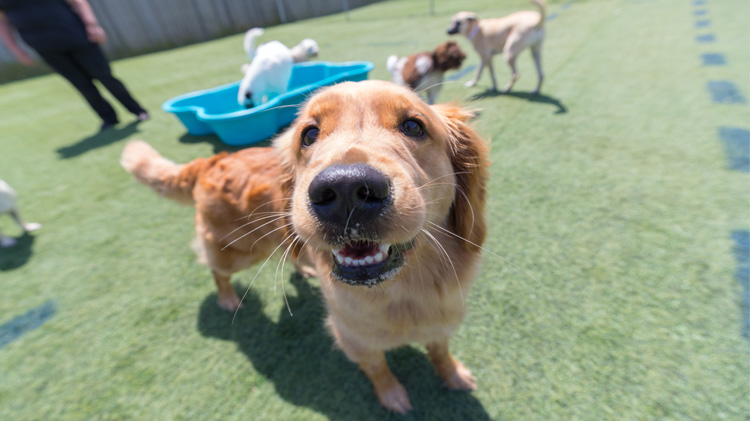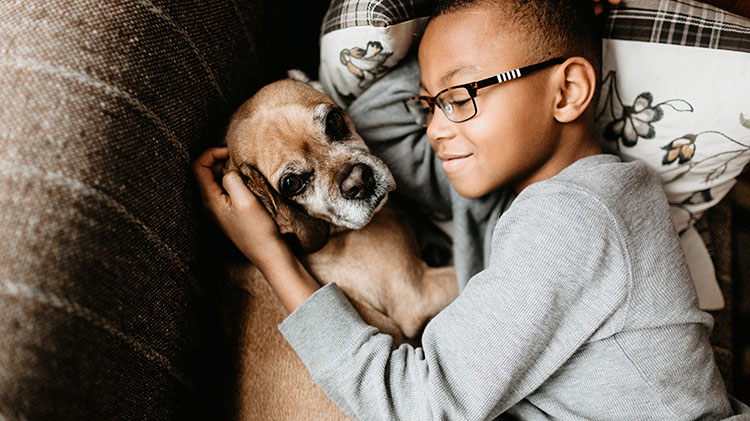What to expect in the first 3 months after adopting a new dog
The first three months with a new adopted dog are filled with surprises, but you can prepare by being flexible and following the 3-3-3 rule.
Getting a new dog or puppy is an exciting time for you and your family. But it also comes with a fair amount of turbulence. Even the most prepared pet owners often get caught by surprise with the level of care and attention a new adopted dog needs, not to mention the time it takes for them to adapt to their new surroundings. And that’s not even counting all the hours of dog training that comes with responsible pet ownership.
Whether you’re still looking at prospective pets or recently welcomed a new four-legged pal home, it’s important to plan for the months ahead and give your pup the environment they need for a healthy adjustment.
How to help a dog adjust to a new home
It can be challenging at first to know what to do when you get a new dog. But the first days and ensuing weeks will go even more smoothly if you take the time beforehand to puppy proof your home. Stock up on food, a bed, toys and other essentials, and put any potentially harmful items far out of reach. Doing all of this ahead of introducing your new dog to your home will help ease the transition and give you more time to focus on bonding.
While you’re at it, set up a special room or closed-off area just for your dog when they first come home. In accordance with the 3-3-3 rule (which we’ll discuss in just a moment), your new pal may feel overwhelmed at first and will need some time to adjust more slowly. Gradually introducing him to the house instead of opening it to him all at once will help keep potential pet anxiety and shock at bay.
You’ll also want to consider protecting your dog with pet insurance sooner rather than later. Life with a new dog can be unpredictable, after all.
What is the 3-3-3 rule of pet adoption?
You may have already heard of the different phases that come with bringing home an adopted dog, which can be categorized under the “3-3-3 rule.” This term encompasses the initial stages and milestones of new dog ownership:
- First 3 days — your pup is brand-new to the environment and may feel overwhelmed.
- First 3 weeks — your new dog has relaxed and is ready for training.
- First 3 months — your dog has become part of the family and may be ready for more advanced training.
Because it is often used specifically in reference to dogs from shelters or rescue agencies, the 3-3-3 rule is even sometimes called the “rescue dog honeymoon period.” While every canine adapts a little differently to their new home and family members, you can help make the process more seamless by setting reasonable expectations during the 3-3-3 rule time intervals.
The first 3 days
Even the friendliest dogs can feel overwhelmed during the first few days in a new space. Both puppies and older dogs can become frightened and unsure of what’s happening, and they may not act like themselves. Wanting to hide or be in solitude is normal, as is not wanting to eat or drink much. Be aware that it’s also normal for you to not “click” immediately with your dog at this time. They need time to relax and warm up to their new situation.
The first 3 weeks
By the time the three-week mark rolls around, your dog is likely comfortable exploring his surroundings and is more responsive to you as his human. This is also when his habits start to take hold. So, it’s time to start implementing good discipline and behavioral rules.
While your dog should be mostly potty trained by now, this is a good time to begin other dog training if you haven’t started already. From “sit” and “stay” to on-leash etiquette, it’s important to be consistent and practice every day. If you wait beyond these first few weeks to set boundaries and start dog training, your pooch will have a tougher time learning later on.
The first 3 months
Once you and your dog hit the three-month mark together, they're probably feeling like a full-fledged member of the family. If training and practice with commands has been consistent, your pup has an established daily routine and has built up a significant amount of trust in you. But while this is definitely a time to celebrate, don’t let discipline fall by the wayside.
A good way to make sure you’re staying on top of things is to start incorporating more advanced training into your routine. Playtime and walks are important, but training continues to build your bond with your dog through trust and active learning together.
Things that can affect new dog adjustment
When you’re focused on how to help a dog adjust to a new home, it’s important to consider your dog’s background and age. Depending on where they spent their first weeks, months or years of life, it may take them longer to adapt to and bond with a new owner and home. You’ll want to allow your new dog some extra time if they fall into any of the following categories:
- Adult dog (particularly above three years of age)
- History of abusive pet ownership or abandonment
- Rescue dog / shelter dog
- Breeder (who may not have provided proper early training or care)
That said, the majority of dogs from these scenarios go on to adapt to new owners and homes just as readily as dogs from other situations. If you’re concerned about your dog bonding properly, talk with your veterinarian about local resources that can help.
How long does it take a rescue dog to adjust?
ASPCA statistics show that about 2 million dogs are adopted from shelters and rescue agencies every year in the United States. While many rescue dogs can appear extra anxious or timid upfront, the success stories tend to be overwhelming. The 3-3-3 rule is most often referenced with rescue dogs from shelters in mind, so following it with your dog should put you on the right path. Like many pet owners, you’ll likely be surprised by how fast and easily your new four-legged friend becomes an integral part of the family!
Looking for more tips on bringing home a new dog and practicing pet safety? Check out our collection of articles just for you and your furry friend.
Terms and conditions do apply. We love informed decisions. See the Trupanion policy for full coverage details.
